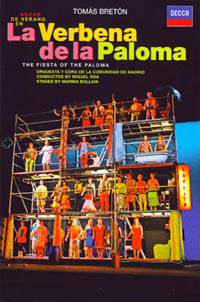Decca
 Noche de verano en
Noche de verano en
la verbena de la Paloma
director: Marina
Bollaín
Teatro Auditorio de San Lorenzo de El
Escorial, 2006
Decca DVD 074
3262
(75 mins, 12 mins documentary)
In the brief documentary extra Marina Bollaín talks about the necessity to “update” classic zarzuela to our own time, “because when it was written it was contemporary”. Her staging, a hit when first staged in Berlin and equally so when reinvented for the opening of the new El Escorial theatre [review], pulls no punches. On a fabulous Street Scene scaffolding set, a Madrid advent calendar where everyone’s visible at all times and where privacy doesn’t exist, the inhabitants of la Paloma work, play, love and fight in a vortex of music and emotion. Bretón’s score is augmented with Cuban salsa and songs, and for an intermedio we get the Chueca-like pasodoble from Torroba’s María Manuela.
It was evidently a hoot. But home DVD is unforgiving, and without the live wow factor Bollaín’s street party is cruelly exposed as much for its theatrical conventionality as its dramatic stupidity. Underneath the Almodóvar trappings, this staging is neither radical nor truly contemporary, but just another chunk of old-fashioned Spanish tourist schlock.
The problem is that La verbena de la Paloma is not a walking zombie in need of modern clothes and manners in order to galvanise it into life, but a living and breathing classic verse comedy which touches deeply on the urban human condition. How you dress it up is largely irrelevant. You’d be forgiven for not spotting that here, where de la Vega’s complex mix of degree – whether of social standing, age or emotional insight – is steamrollered by the need to party. Comparisons with Calixto Bieito’s darkly cogent vision, with its coke-sniffers and venereal filth [review] show up the one-dimensional triviality of Bollaín’s approach.
Three examples from many. Turning Julián from a printer into an outmoded gas butane salesman flattens de la Vega’s original character, with its suggestion of the radical, working-class educated malcontent. Here he’s just a sympathetic, ordinary, lumpen bloke. Having the bawdy old vulgarian Antonia played as a transvestite male hairdresser would be fun, if anything at all were made of the idea as far as character, motivation or behaviour were concerned. All we have is a man in a dress. Worst, turning Don Hilarión into a sexy, long-haired, leather-clad 30 year old and reducing his social status to that of everyone else, removes the complex tensions of age and youth, money and poverty, power and impotence which make plot and music of this masterpiece so dynamically, universally suggestive.
 I’m sorry to be a party pooper, especially given the
technical strength of the production and Miguel Roa’s
musical preparation. And most of the performances, especially
José Antonio López’s richly nuanced
Julián, are very engaging. The usually excellent David
Rubiera fails to make a convincing case for young Hilarión,
dead behind the eyes even when gifted with two rubber ducks to play with in his
couplets-bath scene. Federico Gallar’s
cross-dressing Antonio is oddly blank, though his imported habanera is
beautifully sung. Picture quality and camera work are unobtrusive, but none of
that helps Bollain’s show transcend its ephemeral, modish superficiality.
And for La verbena de la Paloma, that is simply not good enough.
I’m sorry to be a party pooper, especially given the
technical strength of the production and Miguel Roa’s
musical preparation. And most of the performances, especially
José Antonio López’s richly nuanced
Julián, are very engaging. The usually excellent David
Rubiera fails to make a convincing case for young Hilarión,
dead behind the eyes even when gifted with two rubber ducks to play with in his
couplets-bath scene. Federico Gallar’s
cross-dressing Antonio is oddly blank, though his imported habanera is
beautifully sung. Picture quality and camera work are unobtrusive, but none of
that helps Bollain’s show transcend its ephemeral, modish superficiality.
And for La verbena de la Paloma, that is simply not good enough.
© Christopher Webber 2009
Noche de verano en la
verbena de la Paloma, zarzuela in one act. Music: Tomás
Bretón; text: Ricardo de la Vega (adapted by Marina Bollaín)
Cast: Julián – José Antonio López; Susana –
Amparo Navarro; Casta/ Cantaora – María José Suárez;
Don Hilarión – David Rubiera; Don Sebastián – Emilio
Sánchez; Señá Rita – Marina Pardo; Tío
Antonio – Federico Gallar; Bailaora – Nuria Castejón;
Severiana – Cristina Luar; Tabernero – Felipe García-Vao;
Vecina – Anabel Aldalur; Joven 1º/ Guardia 1º - Fernando Cobo;
Joven 2º/ Guardia 2º - Ángel Sáiz. Marina
Bollaín (d.); Josune Lasa, Natascha Von Steiger, Marie Greffath
(design); Josune Lasa (costumes); Olga García (lighting); Nuria
Castejón (choreography). Orquesta de la Comunidad de Madrid; Coro de la
Comunidad de Madrid (Félix Redondo, chorus director); Orquesta Graffiti;
Miguel Roa (c.)
![]() en
español
en
español![]() dvd
index
dvd
index![]() cd
magazine
cd
magazine![]() zarzuela
homepage
zarzuela
homepage
27 July 2009